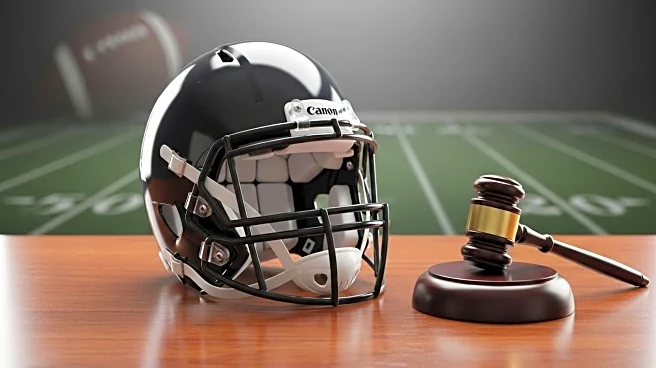What's Happening?
Louis Moore, the leading tackler for Indiana University's football team, has won a legal injunction against the NCAA, ensuring his eligibility for the remainder of the 2025 season. The decision was made by Judge Dale Tillery in Dallas County Court, following Moore's challenge to the NCAA's junior college eligibility rules. Moore's initial waiver request for an additional year of eligibility was denied by the NCAA, despite a blanket waiver issued in December granting athletes an extra year of eligibility for the 2025-26 season. Moore, who has received $330,000 in NIL payments from Indiana University, faced the possibility of losing his scholarship and having to repay some of the NIL money if he lost his eligibility. The injunction will remain in effect until a trial scheduled for January 29, 2026, ten days after the national title game.
Why It's Important?
This ruling is significant as it highlights ongoing disputes between student-athletes and the NCAA regarding eligibility rules, particularly for those who have transferred from junior colleges. The decision not only benefits Louis Moore but also sets a precedent for other student-athletes facing similar challenges. The case underscores the complexities of NCAA regulations and the impact of NIL contracts on college sports. Moore's victory in court allows him to continue contributing to Indiana University's successful season, where the team is currently ranked 12th nationally. The outcome of this case could influence future NCAA policy decisions and the handling of eligibility disputes, potentially affecting the careers and financial opportunities of many student-athletes.
What's Next?
The injunction granted to Louis Moore will remain in place until the trial scheduled for January 29, 2026. During this period, Moore will continue to play for Indiana University, contributing to their season. The trial's outcome could further impact NCAA eligibility rules and the enforcement of the Five-Year Rule. Stakeholders, including other student-athletes, universities, and legal experts, will be closely monitoring the case as it may lead to broader changes in NCAA policies. The decision could also prompt discussions on the fairness and application of eligibility rules, especially concerning junior college transfers.
Beyond the Headlines
The case raises important questions about the balance between NCAA regulations and the rights of student-athletes, particularly in the context of NIL agreements. It highlights the potential financial implications for athletes who are denied eligibility and the broader impact on their careers. The legal battle also reflects the growing influence of NIL contracts in college sports, which can significantly alter the dynamics between athletes and institutions. As the NCAA navigates these challenges, the case may lead to increased scrutiny of its policies and the need for reforms to ensure fair treatment of all student-athletes.








